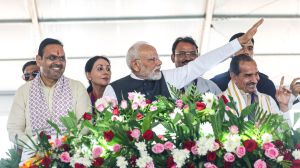Court monitoring committees illegal…stop PIL blackmail: Justice Katju slams his own
For the first time, a sitting Supreme Court judge has openly slammed the practice of courts setting up monitoring committees...

For the first time, a sitting Supreme Court judge has openly slammed the practice of courts setting up monitoring committees — like in the sealing case — calling it “wholly illegal.” And has also urged courts to be more selective while taking up PILs saying “much of PIL is really blackmail.”
Justice Markandeya Katju, who had last year pulled up the Delhi High Court for straying into what was not its domain, held today that court-appointed committees or panels were “outsourcing of judicial functions” which, he said, was illegal and “unconstitutional.”
“The court cannot abdicate its function by handing over its powers under the constitution or the CPC or the CrPC to a person or committee appointed by it,” the judge observed underlining that these committees attract “adverse public comment due to the alleged despotic behaviour…”
“The power to issue a mandamus or injunction is only with the court,” he said. Although he agreed that the court could certainly appoint a committee to gather information or receive suggestions, he said “the court cannot arm such a committee to issue orders which only a court can do.”
Justice Katju’s remarks figure in his verdict where the Court refused to pass any directions on a PIL filed by an NGO, Common Cause, seeking directions to the government to formulate a suitable Road Traffic Safety Act, besides issuing directions like setting up procedures for licencing of drivers and making readily available ambulances for shifting injured in accidents.
Justice H K Sema, the other judge on the bench however “disassociated” himself from Justice Katju’s views. However, he agreed with Justice Katju on the point that relief sought in the petition is “adequately taken care of by the Motor Vehicles Act itself and if there is any lacuna or defect, it is (up to) the legislature to correct it by amending the Act and not the Court.”
In a polite yet firm reminder to the judiciary, Katju remarked that very often courts do not realize their own limits. “Apart from the doctrine of separation of powers, courts must realise that there are many problems before the country which courts cannot solve, however much they like to,” he said. “The country can ill afford to be governed through court decrees,” he said. Arguing that any attempt to pass such writs/orders would not only be “grossly undemocratic” but would be most hazardous as courts do not have the expertise or the resources in the connection, the judge urged the judiciary to dispense justice according to law and Constitution. “He cannot ask other branches of the State to keep within their constitutional limits if he exceeds his own, he said quoting the famous adage, “Who will guard the Praetorian guards?”
“Unless judges exercise self-restraint, each judge can become a law unto himself and issue directions according to his own personal fancies, which will create chaos,” he said.
Strongly rebutting conventional wisdom that the judiciary is a panacea for all ills, Justice Katju noted that it does great harm to people “because it makes them believe that their problems can be solved by others and not by their own struggles and creativity but by filing a PIL.”
“If the legislature or the executive is not functioning properly, it is for the people to correct the defects by exercising their franchise properly in the next elections and voting the candidates who will fulfil their expectations or by other lawful means,” he said, “The court can play a catalytic role with regard to the social and economic problems of the people. However, it has to apply somewhere and at sometimes brakes to its self-motion, described as self-restraint.”
Outlining the dangers of judicial activism, he deplored courts entertaining PILs as “routine” saying that this “choked” the dockets of superior courts “obstructing the hearing of genuine and regular cases.” Much of PIL “is really blackmail,” he said, adding that it largely developed into “an uncontrollable Frankenstein and a nuisance.”
Today’s remarks by Justice Katju are a stronger echo of what he had said on December 6, 2007. Deciding on an appeal filed by a Haryana golf club where the court had virtually created a job, he had said: “Judiciary should confine itself to its proper sphere, realizing that in a democracy many matters and controversies are best resolved in non-judicial setting…Judges must know their limits and must not try to run the Government. They must have modesty and humility, and not behave like Emperors.”
He had singled out the Delhi High Court for criticism saying its orders on a sweeping range of issues — from school buses to ambulances, quality of air to begging in public — were “matters pertaining exclusively to the executive or legislative domain.” If there is a law, he had said, judges can certainly enforce it, but “Judges cannot create a law and seek to enforce it.”
He cited the Delhi High Court direction that there can be no interview of children for admissions in nursery schools. “There is no statute or statutory rule, which prohibits such interviews. Hence the Delhi High Court has by a judicial order first created a law (which was wholly beyond its jurisdiction) and has then sought to enforce it,” he had said.




- 01
- 02
- 03
- 04
- 05


























